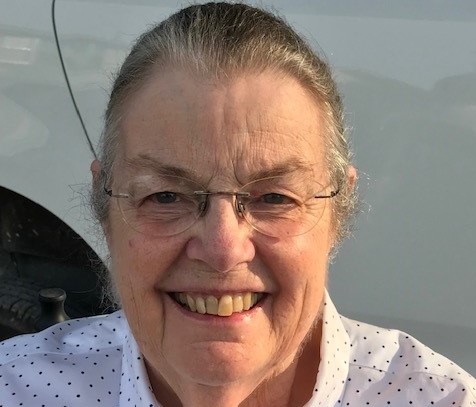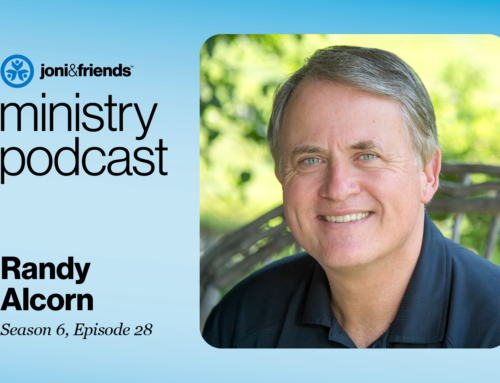Living in God’s Love: A Call to Christian Community
Subscribe to the Joni and Friends Ministry Podcast

Kay Toombs, a Christian, professor, and author who lives with disability, returns to the podcast to explore the transformational power of intentional Christian community.
Over decades living with multiple sclerosis, Kay has reflected and taught on issues related to illness, disability, caregiving, and healing, as well as the role Christianity can play in creating a sustainable culture and caring communities.
What can God show us through illness?
Kay understands the difficulties that come with disability and chronic illness. She has also seen God use hardship—in her life and the lives of others—to demonstrate important truths.
She shares three profound truths that God can show us through serious illness:
1. “Serious illness causes us to stop whatever we are doing and think carefully about what is really important in our lives… [it] provides the opportunity and the impetus to reach out to God in a new and deeper way. As the Psalm says: ‘Hear my cry, O God; listen to my prayer. From the ends of the earth I call to you; I call as my heart grows faint; lead me to the rock that is higher than I.’ Psalm 61:1–2”
2. “Serious illness shows us in a concrete way that holding onto the drive for independence, autonomy, and absolute control over our lives is an illusion… Illness clearly demonstrates we’re not in absolute control over our lives.”
3. “Serious illness shows us that we need one another. We need others to accompany us on our journey.”
How can Christians turn from radical autonomy to relationship with God and others?
Kay points out that modern culture steers us away from community and interdependence.
She says: “There is a very unrealistic emphasis on autonomy, on radical individualism, on independence, which de-emphasizes relationship. You know, we’re all told, we’re able to stand on our own two feet, look after ourselves, do our own thing. So dependence on others in contemporary culture is considered to be weakness.
Consequently, elderly people, people with disabilities, people who have to ask for help feel that they are a burden. And they may very well be told that they are a burden and full-time caregiving is seen as a kind of negative form of self-sacrifice.
It’s very difficult for people to admit vulnerability in a culture that’s characterized by a competition, jockeying for position, lack of trust, and… very negative attitudes about disability.”
Christians, and Christian community, have a radically different value system from that of the world, recognizing people’s God-given value, and seeking the good of others before our own self-interest. As Kay says, the foundation of Christian community is self-sacrificial love.
“Greater love has no one than this: to lay down one’s life for one’s friends.”
John 15:13
How can Christian community create a sustainable, caring culture?
The call of the Gospel clearly points away from isolated individualism toward loving relationship—recognizing that we need God and one another. Kay references Paul’s words in 1 Corinthians that show how each person in the body of Christ has intrinsic (not instrumental) and particular worth.
“The eye cannot say to the hand, ‘I don’t need you!’ And the head cannot say to the feet, ‘I don’t need you!’ On the contrary, those parts of the body that seem to be weaker are indispensable, and the parts that we think are less honorable we treat with special honor. And the parts that are unpresentable are treated with special modesty, while our presentable parts need no special treatment. But God has put the body together, giving greater honor to the parts that lacked it, so that there should be no division in the body, but that its parts should have equal concern for each other. If one part suffers, every part suffers with it; if one part is honored, every part rejoices with it.”
1 Corinthians 12:21–26
For years Kay has lived in an intentional Christian community. Through her own disability and a season living through her husband’s illness and death, the body of Christ has brought God’s love tangibly into Kay’s life.
She reflects: “As I look back on my life—you know, one of the advantages of getting old is that you really can look back on your whole life—I can see that God has been there all along, even when I didn’t acknowledge his presence, even when I didn’t know his love in the way that I do now.
When I was overwhelmed with the chaos of my life, God brought these people into my life, and brought me closer to him in a way that I could then come to really know him. And God has used my illness… as the springboard for my work. He’s opened doors to make ways for me to share my reflections with other people. And that has given me such joy and such meaning in my life, and I’m so grateful for that.”
How can faith enrich our experience of caregiving?
“How good and pleasant it is when God’s people live together in unity!”
Psalm 133:1
Kay experienced her husband’s end of life in the midst of supportive community. In the last months of his life, Kay and fifteen ladies from her community cared for him together. And young people in the community came to sing for Kay’s husband, draw pictures for him, and keep him company.
“The bonds that were developed between us, the bonds of love… will never be broken. In sharing our lives together, caregiving and care receiving is not a burden; we can see it as a form of communion, and it’s an opportunity to develop deep and meaningful relationships with one another. We see illness as an opportunity for opening us up to the miracle of relationship.”
Kay
Kay also points out that caregiving is a reciprocal relationship—not one-sided.
“The caregiver receives a lot from the person to whom they’re giving care. They also receive a lot in what it does to their character. It enables them to show love to this person in a very special kind of way.”
God at Work in Christian Community
The Bible calls followers of Christ to love one another. Kay shared examples of Gospel love at work in her community. For one, people of all ages in the community understand the seasons of life—including seasons of illness and end of life.
“When a woman was dying of cancer in the community, and she couldn’t sleep, young people volunteered to go and sing for her through the night.”
“We have a 24-hour prayer chain.”
“Jesus came to me in the people who visited every day [when Dee was dying], in the sisters who cared for Dee, in the sisters who came and stayed overnight so they could help me in the night, in the children who came and sang for him and drew pictures for him, in the tears and laughter we shared in the people who sat by his bedside and held his hands, and in the friends who were present with me when he took his last breath.”
“In the most difficult of circumstances, as the reductions of illness became greater and greater, and our boundaries constricted more and more, the love we felt for each other became greater and greater. And in the end, there was nothing left but our love for one another, the love we felt from others, and the love we felt from God.”
God’s Personal Presence
Kay shared how God’s Spirit has drawn near to her, providing hope, comfort, and joy—even in the face of death. She shared:
“My illness and Dee dying brought me into a closer relationship with God because I recognized my need for God in the ultimate way. In the last six months of my husband’s life, I felt the presence of God so strongly… and then another great gift that the Lord gave me, the night that Dee died, I spent the night in the room where Dee and I had slept for many, many years. And I felt the Lord tangibly present and all night long, all I could hear was the voice of one of our singers singing the song, “I Know My Redeemer Lives,” and I felt a celebration, not simply a mourning.
And in the midst of his illness, Dee had said, ‘This is not the end. It’s a new beginning.’ And that night, sitting there, listening to that hymn, I knew that Dee had embarked on his new beginning; and without the grace of God, I would not have been able to go through any of this. But the grace of God has enabled me to do it. For that I am very grateful.”

Songs of Suffering: 25 Hymns and Devotions for Weary Souls
Written to spark hope—through nights of pain and seasons of grief—this devotional and hymn book by Joni Eareckson Tada provides biblical encouragement for anyone seeking comfort and a song of hope in the darkness.











